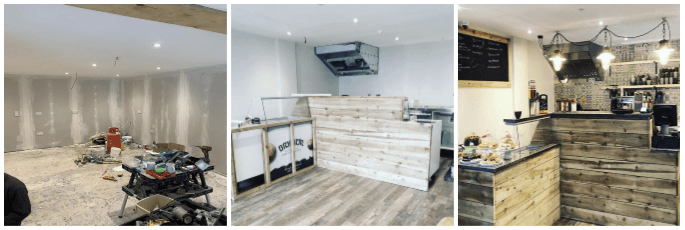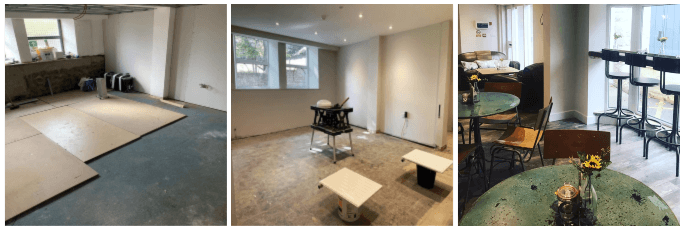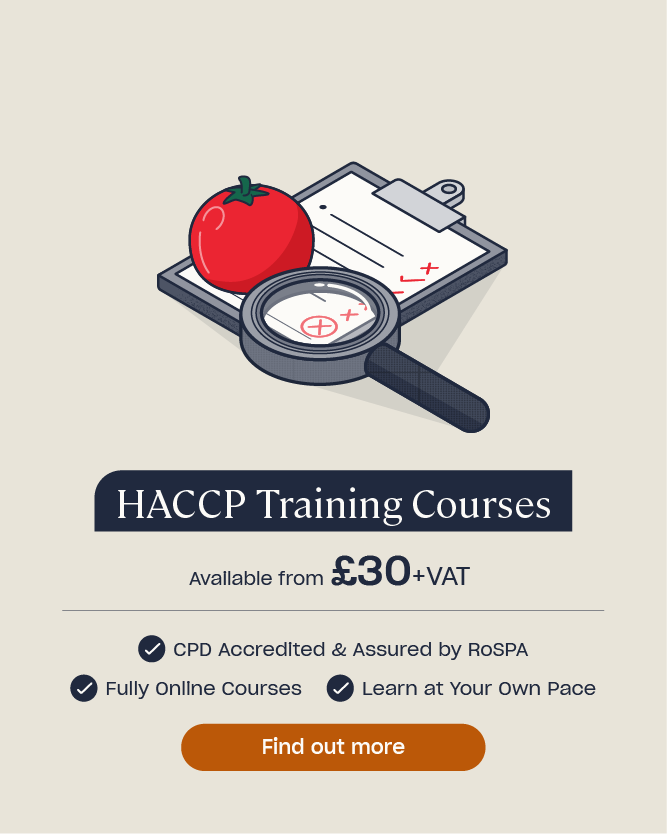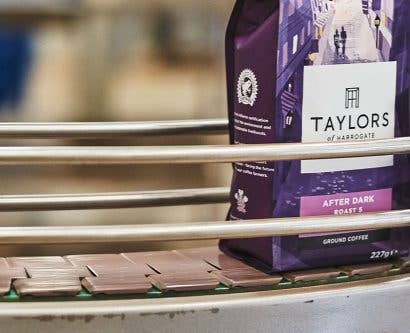Case Study: Fostering a Happy and Safe Culture at Bobbins Cafe
The Challenge at Bobbins Cafe:
- Onboarding new starters
- Getting all staff to the same level of compliance and knowledge
- Recognising that staff want to develop and might go elsewhere, but not seeing that as a problem
The Objectives:
- Ensuring all staff are compliant with food hygiene and safety best practice
- Achieving a consistent and high standard of knowledge amongst all staff, particularly those with no previous experience
- Find a training solution that doesn’t drain resources and take up too much staff time
The Solution:
- Invest in staff development as part of a wider goal to create a happy and food-safe culture
- Use an online training tool with full legislation guidance that’s easy to follow
- Acquire supplementary course materials, such as visual reminders and downloadable templates, to support with compliance long after training is completed
Background to Ian Burton-French – Bobbins Cafe Manager
Ian Burton-French’s family trade is in healthcare. At the age of 16, he was gearing up to follow the trade by gaining experience in a nursing home and preparing to study the subject at university.
However, before he could pursue what he thought was his life ambition, Ian accepted a job as a holiday rep to do something ‘a little different’. Fast forward 18 years and it’s fair to say the hospitality industry stole his heart, sending him all over Europe – from resort managing in the french alps to running a family hotel in Corfu. He even enjoyed a short stint as cabin crew before returning to hotel receptions back on home turf.
Following a short career break to see the world, get married, and consult freelance, Ian is embarking on his next challenge: the set up and management of Bobbins, a rural cafe recently opened in North Yorkshire.

How do you identify a need for training?
I find it’s much easier to incorporate training into the planning phase. Whether that is hiring staff for a completely new venture or looking to recruit for an established place, it’s always easier to stop and think: right, what do I need? What will my staff need?
You can then select training based on the needs of the business. If the direction of the business changes, particularly where growth is concerned, it’s not difficult to add to your training requirements when you’ve at least set the foundations.
What brought you to online training specifically?
Online training is particularly helpful in a small business because we don’t have a lot of staff and, therefore, it’s difficult losing a pair of hands for the best part of a day.
With online training, I have several options. If we are quiet, then I have no problem with a member of the team picking up their training on the iPad or laptop and getting through a couple of the modules where they can. Similarly, I’m more than happy for staff to complete the training at home and I will reimburse them for their time. A huge advantage of online training is that you can pause and pick it up whenever you need.

If someone is particularly passionate, online training is a great way to upskill and develop your staff. Bobbins is a small cafe so it is likely the younger ones won’t be ‘lifers’ as I like to call them. However, it’s about taking pride in watching them grow. I want to give my young starters the best possible start to their career so they can learn, be inspired and look back fondly at a job that gave them a good grounding.
Why did you choose High Speed Training?
I’ve used High Speed Training for a long time in previous roles through companies who have supplied the training. It made sense then for me to come straight to you when I embarked upon this challenge, as I’m familiar with the set up and I know it will give me what I need.
I’ve used online training in the past where it’s taken you right back to the start if you pause and come back to it. With High Speed Training, this isn’t an issue – you are able to easily pick up where you left off, so it’s hassle free.
Which courses have you found particularly useful?
For the last few weeks, I have been putting all my staff through Level 2 Food Hygiene for Catering – even the staff who may not be handling food. For the price of the course and the knowledge
it gives them to be aware and safe – for me, it’s a no brainer. It is a negligible amount to make sure staff are maintaining the right standards.
I personally have undertaken Level 3 Supervising Food Safety in Catering & Level 3 HACCP. The training refreshed an awful lot for me and help to cement things I’ve learnt over the years. I also learned new information because things in the industry, especially where food safety is concerned, change all the time.

I think it’s a bit of a problem in the industry that things change over time but you only are obligated to do the training once. I’ve had Level 2 Food Hygiene for 5-6 years but from doing Level 3 it’s clear to see the need to be up to date. There is a lot of value in keeping refreshed so, even though I have the certificate, I would not shy away from evaluating it in a year or two’s time and asking myself if my staff and I need to refresh our knowledge and do them again. I think this should be the case in every food business.
I think it’s so important to be compliant and that involves never missing a step. If the business is legal and compliant, you’re investing in the community, your staff and your business – everyone.
How are you feeling about the EHO audit? What steps do you take to prepare?
People have asked me if I’m nervous and, honestly, I say no because you have to do two things: research and prepare. These are things you should be doing day to day anyway.
For example, the ‘Safer Food Better Business’ should be on hand to document what you need and keep you on track. You should have a list of things you do each day without fail, such as your open/close checklist, fridge/freezer temperatures etc. You need to make sure your staff have done training and, importantly, that they can apply it.
If everyone is using safe working practices, your daily list of chores is adhered to, and your premises is clean and in good condition, then you should never have to worry about an EHO coming in. This standard should be expected in any food business – we should all operate in the same way.
Expert Tip
EHOs are really helpful. Some businesses fear them and think they’re there to catch you out. In my opinion, these are the ones who aren’t sufficiently prepared. If you call your local EHO and ask for advice or clarification on a question you have, they will give help. The purpose of their visit is not to come and criticise, they just want to ensure you run a safe business for the people buying your food.
What were the challenges of starting a cafe from scratch?
If you’re inexperienced the industry is a minefield. When I came here I made a comprehensive list and a timeline of events of what needs to be done. For example,
obtaining a license if you plan to serve alcohol can be a lengthy procedure. There are cost implications and the added stress of having to rely on your local council for the turnaround. So it’s best to preempt things like this that you know you will need and get the ball rolling straight away.
One of our setbacks happened as we were installing the dishwasher. Where we had planned to place it turned out to be a massive problem so we had to start again and replan the kitchen. Up against a timeline and a launch date that’s scary, but it’s much better to constantly audit, be mindful of risks, and find a way to overcome challenges.
Expert Tip
My experiences have set me up to know what to look for and how to solve problems. If you just stick a plaster over things and hope for the best, there may be much worse consequences later on that will set you back more than if you’d just taken the time to step back and reassess when the problem arose.
Some new learning curves for me during this experience were on the catering side: the variety of different options, covering a range of dietary requirements, trends and preferences and also the planning and budgeting – especially with portion prices. However, you can dig deep and find the skills you have learnt along the way to help you. For me, I have plenty of experience budgeting for hotel bedrooms and this is the same but on a different scale. It’s about remembering that and applying it to the new challenge.

There were some locational challenges too. Small villages can find change difficult so it was incredibly important that whoever took on the business was local and could win the affection of the village. Customer service and engagement is really important to me so I instantly set up social media for the business. I grew our followers to 300 in the first couple of weeks by interacting with the community, keeping them informed about what was happening and what to look out for. I was quite overwhelmed actually by the amount of support and well-wishes we have received so far.
What values are you looking to uphold in Bobbins?
I’m passionate about local businesses so my aim is to support them as best I can and reinvest back into the local community. I’m using the local milkman for milk and orange juice, the village store for newspapers, the local butchers down the road in Skipton and so forth.
Staff wellbeing is also something I take seriously. I want them to be happy and I want them to feel like they’re a part of the community. I also want them to feel like they are key to creating it too.
Expert Tip
Creating a good working culture is also important to me, especially where young staff are concerned. They are our next generation and you can learn a lot from them. Everyone has got experience that can be shared and it works both ways, we expect them to learn from us but I also want to encourage them to teach us. I want to create a thoroughly open minded culture in Bobbins.
What Can You Learn From Bobbins?
- If you’re prepared, you don’t need to worry. EHO inspections shouldn’t be a daunting thing, as the very purpose of the visits are to ensure your business is running smoothly, safely and properly. This should, in effect, be your business as usual. The more you implement HACCP procedures, ensure staff are comfortable with the information and carry out regular checks, then you shouldn’t have any concerns when the EHO arrives, as you’ll be able to demonstrate compliance. Similarly, the EHOs are there to support you and your business – use the extra support and ask for advice if you need.
- Training isn’t a ‘one off’ exercise. The renewal dates of most food hygiene and health and safety training are advisory. However, as Ian recognised, legislation and best practice change all the time, especially with food. Ian clearly sees the value in refreshing your knowledge, no matter how experienced you are. Similarly, he recognises the urgency to stay up to date in the industry.
- Invest in your staff, no matter what. It doesn’t matter if your staff are there to stay or if they’re at the beginning of their career. Taking time to develop their skills and knowledge is a great way of fostering a happy and safe working culture.











